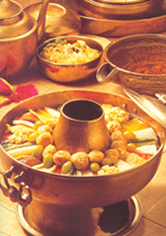 Hwang Hae-sung was born in July 1920 in Cheonan. When she was sixteen years old, she went to Japan to study home management and food. Later, she came back to Korea and taught students at Sookmyung Women’s University. There was one problem. She was asked to teach Korean food. However, she had not taken any courses. Hwang Hae-sung only studied about Japanese and Western food. Thus, she went to Nakseonjae where the queen and court ladies lived.
Hwang Hae-sung was born in July 1920 in Cheonan. When she was sixteen years old, she went to Japan to study home management and food. Later, she came back to Korea and taught students at Sookmyung Women’s University. There was one problem. She was asked to teach Korean food. However, she had not taken any courses. Hwang Hae-sung only studied about Japanese and Western food. Thus, she went to Nakseonjae where the queen and court ladies lived.Nakseonjae was a very meaningful place in Hwang Hae-sung’s life because she met Han Hui-soon, the last cook of the Chosun Dynasty kitchen. Court ladies were not allowed to speak with any other person, so she couldn’t make eye contact with Han Hui-soon for a long time. In addition, she couldn’t talk with her. However, she always went to study Korea royal cuisine at Nakseonjae. She worked hard to record Korean royal cuisine’s recipes. Months later, Hwang Hae-sung became Han Hui-soon’s student. She was taught Korean royal cuisine by Han Hui-soon for about 30 years.
At that time, Korean royal cuisine study was a very important field. Thus, Hwang Hae-sung made the Institute of Korean Royal Cuisine. The Institute of Korean Royal Cuisine was established in 1971 when Chosun Dynasty royal cuisine was selected as Intangible Cultural Asset No. 38. This center is unique in Korea. The center’s role is traditional food education and publishing cuisine books. She published a lot of books about Korean royal cuisine. She said, “I want to inform students about Korean royal cuisine.” The center has researched Korean royal cuisine, native local foods, the culture of food, and old documents. In addition, the center has sometimes held exhibitions about the culture of Korean cuisine. These activities informed other countries about Korean culture.
Hwang Hae-sung had a big chance in her life. German President Heinrich Lübke visited Korea in 1967. She prepared the dinner. Heinrich Lübke praised her, and President Park Jung-Hee also praised her food. When other countries presidents visited Korea, she always prepared dinner. During the South-North Korean summit talks in 2000 in Pyeongyang, Hwang Hae-sung’s daughter served dinner for South and North Korea’s presidents. Hwang Hae-sung’s family have made a great contribution to Korean royal cuisine.
Hwang Hae-sung died on December 14, 2006. Before she went to hospital, she said, “When the Chosun Dynasty was ruined in the early 20th century, Korean traditional food came to a crisis. However, nowadays I see the development of traditional food, so I am happy.” She achieved very important work. If she hadn't researched Korean royal cuisine, we couldn’t eat them. Hwang Hae-sung is a respected person in Korea.
By Yoo Ho-sang
KMG Junior Reporter
enterprise65@kmu.ac.kr








